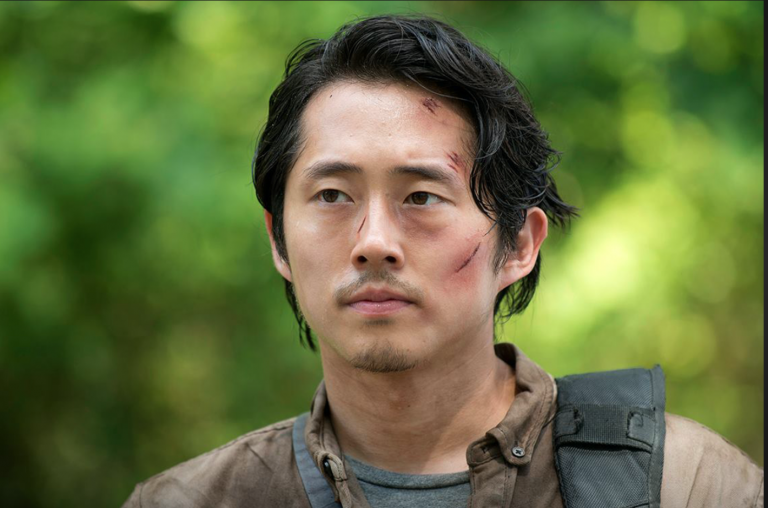
Q: It’s been six months now that we can introduce you as this “Oscar nominee Steven Yeun” and it will happen forever now. How are you feeling about that title?
SY: There are way more worst things to be called. It was a huge honor, and a huge blessing and I guess I’m thankful that nobody refers to me by that in this house, yelling and screaming at me. So it’s all good. [laughs]
Q: I think everybody tuning in tonight understands why you were nominated for an Oscar for that amazing performance in Minari. We’re going to focus on your career post-Walking Dead and the film choices you’ve made, especially your latest film, The Humans. When you left The Walking Dead, did you have a sense of what characters you wanted to play, what kind of work you wanted to do? You ended up working with Boots Riley and Bong Joon-Ho – not exactly small directors. Talk to me about your career focus.
SY: Yes. I wish I could say that I had some grand plan, or a real inkling for what I wanted to do. I think for director Bong, the thing that I got very blessed with was my friend Chris introduced me to him when I took a trip to Korea promoting The Walking Dead. He was kind enough to meet me, and he offered me that role about half a year later over email.
I don’t know what directions I wanted to go in. I didn’t know what was happening. I think largely so many things happen, hard work, but they’ve also been met with such incredible timing and luck and blessings.
When I left The Walking Dead I had just gotten married, I was about to have my first child, and we had just bought a house. And we did it all within one year. And I bless my wife, Joana. But we went on quite a ride. And I think for me, on a personal level, I had spent seven years post-college doing “Incredible Journey” and “Ride of the Walking Dead” and I hadn’t realized how much of that experience had seeped into my reality and my identity. So when I left, I really had to take some time to figure out who I was, especially now that I needed to be a little bit more solid and concrete for an incoming life that I needed to support.
These two opportunities presented themselves and I just jumped at them because it felt like things that didn’t try to put me in a box. The things that came to me after “Walking Dead” were actually really great projects. They were asking me to be the lead, they were asking me to lead a television show. But for some reason, when I would read the synopsis it still felt adjacent to Glenn, the character that I played, and I really don’t like staying in one place for too long. So that was really the motivation for me. I really like doing different things, and I’ve been really, really fortunate.
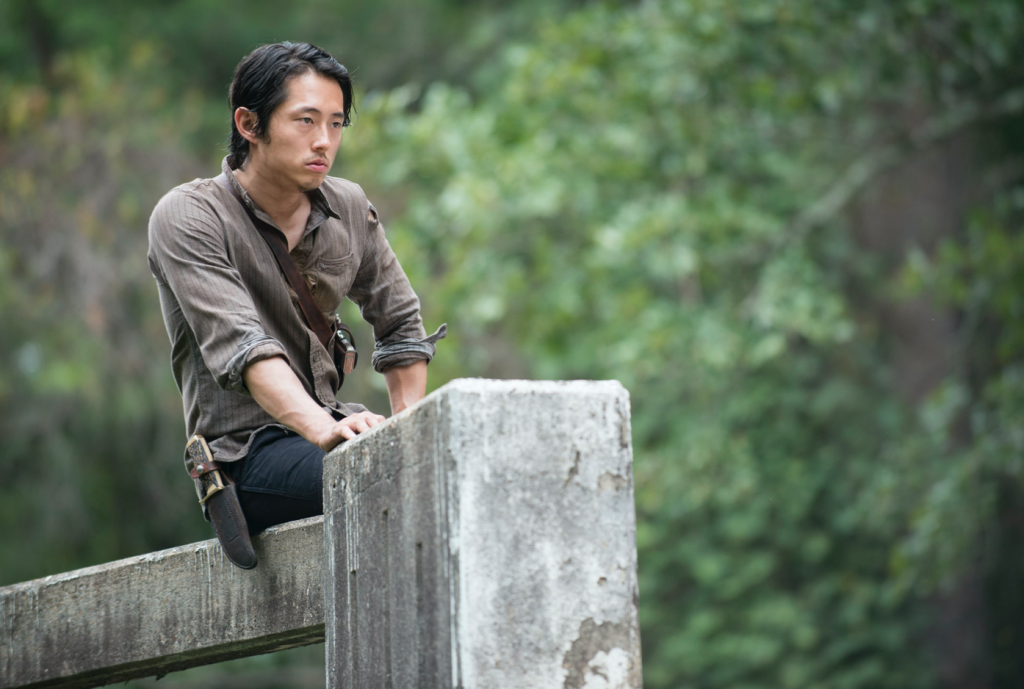
Q: It’s interesting that you say that, because if there was a thesis to our talk today, I was wondering if it was that connective tissue in all of your performances since “Walking Dead” has been what you call the source of your own truth and power which is a duality. These characters are finding themselves not here and not there, in in-between spaces, that’s where the interesting things can happen. I’ll read a quote to you from Boots Riley: “Handsome enough that you thought that Tessa Thompson was going to go after him.” And then what director Bong said of you in Okja:“He’s so charming and cute that the audience can quickly forgive him. That duality is in delicate balance, something only Steven could have pulled off. He’s always trying to be sweet, but he has this other side that’s hard to predict.” And the reason why I’m setting that up is because from there, I do think that’s where we find Ben in “Burning”.
[shows clip from “Burning”]
Q : That scene is deeply unsettling the first time you watch it. It becomes more unsettling with every rewatch of the film. Can you tell me your process of going into that scene [in terms of] that duality of Ben, and some of your other characters?
SY: Yeah, that film in and of itself overall as an experience for me was truly incredible. It was one of the most formative experiences for me so far in my life.
I think what “Okja” opened up my eyes to was just how displaced my being felt. But I hadn’t really acknowledged it until I was forced in some way to play kind of an expat that’s caught in between those two spaces in the literal versions of United States and Korea, and the painful nature of being misunderstood from both angles. Okja for me was a great time, it was so fun. But also it really starkly opened my eyes, because I hadn’t really worked in Korea before.
Then going through “Burning” was a whole different experience because director Lee was asking me to go so deep into being Korean that he kind of goes off into the other side of it, into this more global space. He’s not supposed to be necessarily a Korean-American person. He’s actually supposed to be a Korean national that has traveled and has experienced the world because of his privilege, so he kind of has this strange global vibe to him.
I think simulating that, having to go through the work of language immersion that way, being a – what we call “kyo po”, an expat or an immigrant out of the country, out of Korea, and coming back. I think my language skills were always apologetic. It was always spoken from a place of “Oh, this is not the language that I use every day”. When I was growing up, we would go to a Korean church, and the type of Korean that I ended up using a lot was always honorific to older people, so I never learned colloquial, natural Korean. I knew it, but I never had to do it. So going to Korea and immersing myself, it really took awhile to get to this place where I felt like I was able to speak Korean in that same way that’s just like my English. Like “Hey, what’s up?”, there’s no hierarchy attached to it.
That was due to the coaching that director Lee put me through from himself, which was so valuable. And also the immersion of just being there and speaking with him, speaking with Yoo Ah-in, speaking with Jong-seo [Jeon]. I shed a lot of things, and I reabsorbed a lot of other things.
And after coming back from that experience getting to play someone that is so beyond any construct, he’s beyond nationalism, he’s beyond boundaries, he’s just floating in this nebulous existence where he can enact and do, essentially, whatever he wants to.
That’s a feeling, to be quite honest with you, that’s never been afforded to me. Not that that’s a good feeling per se, but that level of power and status is a thing that I have never able to access, living here in the West. And then getting to do that over there, it alters you to feel that.
So a way to put it is, I felt like I had done some weird work of pulling away a lot of my Western domestication and in doing those scenes, it felt so fun and free. It was just him speaking about the existence that he’s in, which feels so natural. So to me it felt like Ben wasn’t necessarily speaking from an evil place.
I’m not going to give any answers as to who Ben is. You could take it as he’s an evil person, or you could take it as that’s so nihilist but is that not true, to some degree? What is nihilism? I think what’s scary about what he’s trying to say there or what he says is just the casual nature by which he says it. It’s almost as if he doesn’t care about anything – and in some ways, he doesn’t. And I think that is really the scary part of him. Even if he’s a good guy, I don’t think he really cares about anybody.
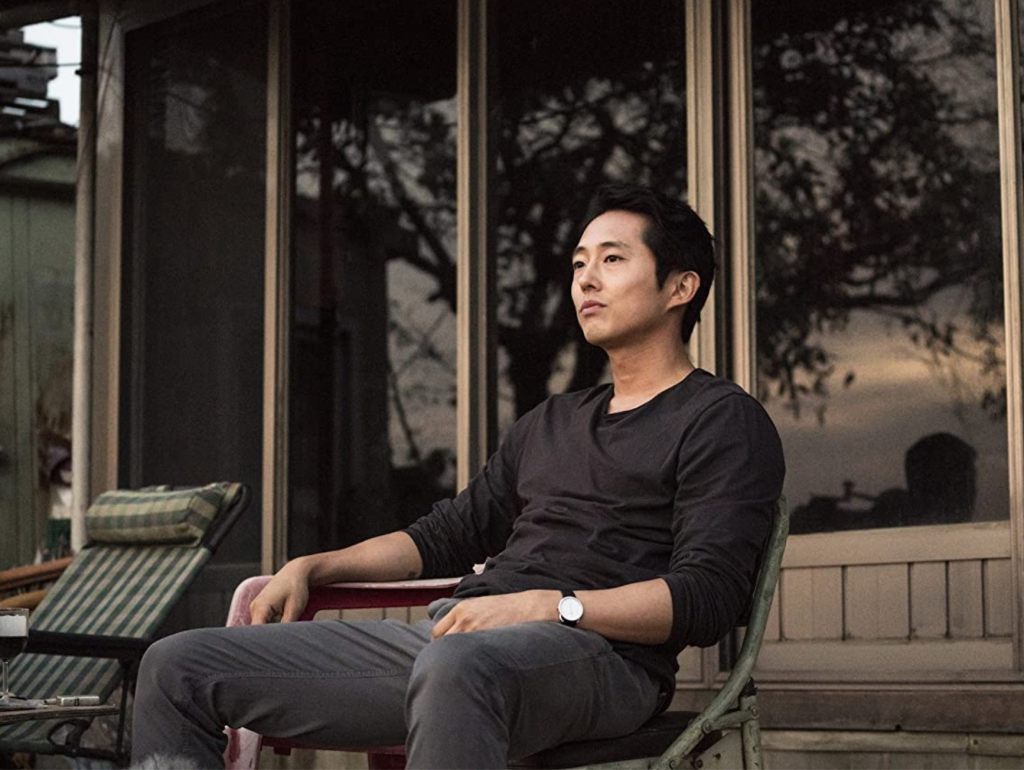
Q: It’s clear that performance was a turning point for you as an artist. Can you talk about whether or not it was a turning point for you in terms of how other people saw you as an artist? How do you think this influenced the opportunities you’ve gotten?
SY: What’s interesting is that same similar type of energy I was also kind of getting an early taste of when I did “Sorry to Bother You”. Boots had empowered me with a role that was a person who knew something that other people didn’t know, and I think that is a very powerful place to enact from. Squeeze is a union organizer who’s sitting in the pocket of a union in a place that probably is calling to be unionized but can’t mobilize to do so. And for him to be able to sit in those lanes, in those middle lanes, and just speak to people and see the system for what it is, it’s a chill place. That’s kind of the same vibe that I was touching. And then when I got to do Burning in that same year, it was a real trip.
So after “Burning” came out, certainly I think the offers for projects that people wanted me to be a part of changed. Stephen Karam got to see “Burning”, and he offered me the role in “The Humans”, which was really cool.
But my goal has always been – and hopefully, that’s what people might notice – I really am obsessed with humanity, and the humanity that I can access. And in some ways that humanity is not really captured well in structures that already exist. It almost has to be excavated out of those small gaps and then those between spaces that people necessarily sometimes overlook. That’s kind of where I’ve always lived in anyway.
Coming over when I was four, I was very aware of the fact that I was not from here. Also I was very aware of every choice that I made to try to [fit in]. Knowing that has always been this weird tugging of how much do I need to comply, how much do I need to survive, and how much can I push against that. Maybe that’s just life. Maybe I just described general life.
Q: You also describe that sense of humanity is probably how a lot of people would describe their experience and their feeling about the film Minari.
SY: Yeah. Around that time, I think Hollywood was starting to expand, which is really great. It was starting to incorporate new voices, films and stories from peoples that usually aren’t heard. I think what was really great was, when I read Isaac’s script the thing that jumped out at me the most was that it didn’t lionize or infantilize this family. It actually centered them. It really centered the family, and I hadn’t read a script like that before.
A lot of scripts that I see, that I had read prior, were kind of about the search for how to be centered in this life, in this world. It was a search for that identity to kind of move itself into being the center of the film. But this one, when I read it I was like, “Oh, this family is already the center.” They are already the main characters, and everyone else is in their world. When I read that, I was so liberated by it and so happy and thrilled.
But then when [Isaac] asked me to play Jacob, the immigrant father, I was like, “Oh, no.” I actually asked him if I could play the son, I was just busy kind of ruining his movie. But then he was really supportive and he instilled in me a lot of confidence. He helped me really attack this thing and really understand it. So I’m so thankful to Isaac for all that.
Because the experience also deeply changed me. Yeah, I feel like the last couple of films have been my turn personally to really reattach and understand the things that maybe I haven’t examined or I had lost in my past.
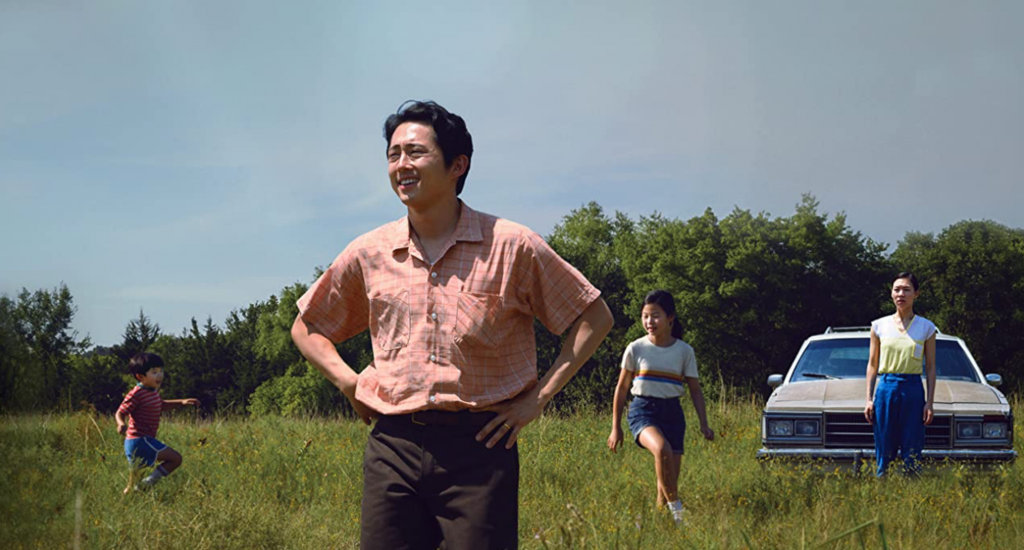
Q: We have a clip from “Minari”:
[clip shown]
I know it was a tight crew and a real community and a collaborative process. When you’re working on set, how much input did you and Yeri [Han] have in terms of crafting that dialog and going back and forth and really grounding that scene?
SY: We had a lot of conversations. Like you said, it was a very collaborative set, it was a very tight set. Yeri and I would come back from filming and have family dinner at the house that Youn Yuh-Jung and Yeri and a bunch of our friends were staying at, and we would just hash it out there. It was almost like we were kind of doing immersion there, too. Nobody was bringing the rules home, but we couldn’t ignore the dynamics that were already kind of playing themselves out in the ways that we spoke with each other.
Yeri is such a powerful, beautiful actor. She is so honest, and so we would have very honest conversations about our points of view as men, women, husband, wife, all the experiences that we’d gone through in our lives, and we just laid it bare on the table. We discussed scenes and in the whole film, even beyond this one scene, there are a lot of [things] that we found naturally in the moments.
And I think the coolest part about that was that Isaac also would take one take and [say] “We got it.” I think he also knew what we were all collectively doing, too, which was not trying to hit his exact marks that he prescribed on the script, but really just opening it up to our collective experience of what this life is that we can all relate to. Yeah, that’s Isaac. He’s incredible.
Q: I read something that you told in an interview with the Hollywood Reporter. You were talking about the Western lens relationship with all the different cultures and how it’s flattened and it’s stereotyped. But there’s an added layer to that with those of us who may consider ourselves third generation – you know, part Western, part mother-culture – where we have also applied that flattened two-dimensionality to our parents.
You really nailed it for me personally; I’d not thought of it like that. But I do realize that I saw my parents as two-dimensional, and I think that does them a disservice. I do think many of us have moved through the world that way in our minds. You talked about how your work in this film was to get rid of that flatness, and actually present our parents as real people. Can you talk a little bit about imbuing Jacob with all that complication that perhaps we’ve denied our older generation?
SY: Yeah. That’s certainly right. I mean, even touching that idea, to me, still gets me emotional because it’s work every day. You liberate your parents from the box you place them in, and then the next time you talk to them, they’re just right back in there. It’s hard. I think that’s the thing we do to each other. Every human being. We’re all just kind of operating from our own bias and our own reality, and so everybody is kind of a 2D construction.
I don’t even know if it was my goal per se, meaning I didn’t know that that was the goal at first. At first, I was just trying to do this thing justice, and as I was starting to play with it, I was like “Why am I trying to mimic the idea of my father?” And then I had to face the fact that I was like, “I don’t know my father. I thought I did, and I don’t know him.” And then I realized “Oh, I only know him through the collective conversations that I’ve had with people about him.
These memes, in some ways, of what our fathers were, which greatly dehumanizes them in larger culture and to ourselves. And then I was thinking, “What is he?” Why I felt fortunate to take on a role like this is, I have my own two children and I’m also married. And we’re all human beings and we all try to live this coexistence with each other and it’s difficult sometimes and it’s beautiful other times.
I started to realize: “Oh, I am my father. I’m not my father, but I am my father” and I can see these things that he might have gone through during his time when he had two young children and he wanted to move to the United States and make a life for himself and his family. What drives him, what pulls him, what maybe goads him off the deep end a little too far? What hurts his family?
When I considered all those things, when Isaac wrote it, he didn’t make the father a saint. He didn’t make the father someone that was perfect and had the righteous understanding that he was going to bring his family to some American Dream/Promised Land. He pretty much wrote something of a complicated human being who couldn’t tell the difference between his selfish desire and what the need of his family was. And I really wanted to show that. I really, really did, because I think he liberated me in the end.
With that exercise, I freed my parents from the burden of my own projection on them, which then lightened my load to be like “Oh, cool, I don’t have to juggle this so much. I don’t have to hold onto this past grievance.” I think one particular thing personally for me was, my parents were oftentimes this reminder that I’m not able to function here in the same ways that my other friends do who don’t have parents like mine. We didn’t go on vacations.
I used to do this joke in my very, very small stint in standup about how when I was a kid, I wanted storage because all my white friends had storage. I was like, “What . . .?” “Why don’t you have all the things packed up everywhere in your house so it’s easily accessible?” I go “Oh yeah, I can’t play Nintendo today, my dad has it in storage.” “I want that. I want to have so many things that I have to put them somewhere else.”
My parents were a constant reminder that I was not of here and I was not able to access the same world or live in the same ways. That doesn’t mean it was necessarily particularly worse; it was just different. But when you’re a child, you just want to fit in. So yeah, just unlearning and relearning was the journey for me.
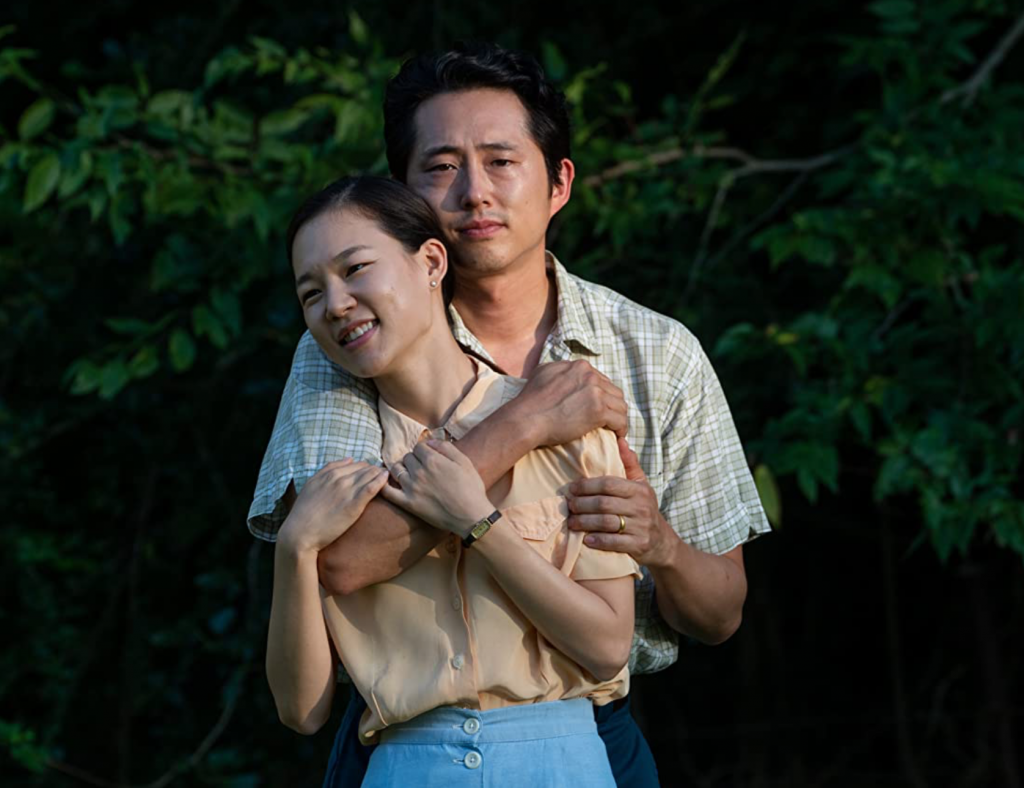
Q: Did it surprise you how warmly embraced and beloved the film was? Did it surprise you that not just the audience, but the industry so embraced it.
SY: Yeah. There are so many things and I don’t know if I have really properly assessed any of them. I’m sure there was a confluence of a lot of things. I think it’s society, and our collective consciousness kind of opening up to other realities, and the desire for that. Especially in the backdrop of a pandemic that really flattened all of our lives in [some] way. Whether we learned a lesson or not, it did make us at least feel that we’re still in this collective feeling of dread and mortality and reality in some way. So I think there was something with that.
But then also, I think for me, what Isaac and I would talk a lot about — and it connects to why I was so attracted to this script — is, this story didn’t require the audience to pass through some sort of cultural authenticity. It didn’t require the audience to apologize for their existence before they could access the humanity of this film. We really just talked about the family and centered them in a way that didn’t present culture before them, didn’t present anything before their humanity. At least that was our intention. And I think in doing so, hopefully, what it did was knock down any barriers to entry so then you can relate to Jacob as a father, you can relate to Monica as a mother, you can relate to Soonja as a grandmother, you can relate to David and Anne as maybe us back in that era. That was a difficult thing for us, too, because we do want to air our grievances, or we do want to say how we feel in some ways.
There’s this thing that Isaac did right before we started shooting. He wrote this incredible voiceover at the end that I read in the car and I just started bawling my eyes out. It was supposed to be a montage sequence at the end, with a flash forward and the speaker speaks about Jacob and Monica. It reads “Minari comes in the pockets of immigrants. That is in the first year and it grows in the second year” and it leads you through. What Isaac and I, as second generation immigrants wanted to say to our parents, which was “We see your struggle and we really deeply respect and honor and are so appreciative of what you went through in order for us to be here.” And it felt right, and it hit all the emotional strings that we wanted to hit. Then right before we started, Isaac cut it. And I was like, “Yes, that’s right.”
That was difficult, but it was so, to me, like the right move, which was, we really don’t want anything good or bad, positive or negative to define these characters beyond just their lives, their right to exist. And I think because we didn’t put those things in, it didn’t compromise itself in some degree. It really allowed access for any human being to see themselves reflected in this story. And if that is the goal that got accomplished, we’re deeply proud of that. At least for me, I’m deeply proud of that. That was our intention. I hope that’s what’s [been] happening.
Q: As you said earlier, your goal is to do as many different things as possible, which brings us to The Humans, your latest film. It’s like a big swing in terms of it being Stephen Karam’s film directorial debut, based on his play. For you, tell me about being able to slip right in there.
SY: I actually shot “Minari” and “The Humans” back-to-back. I shot “Minari” and then I took a week off, and then I went straight to New York and I shot “The Humans”. So it was a weird time. I had been with a new agent that I am currently no longer with, and we would have great conversations. He was like, “What do you want to do next?” and I didn’t have any answers. I said “I just want to be.” I genuinely said that. And then a month later, he goes, “There’s this project called “The Humans”. I was like, “Alright, cool. Let me just read it, it sounds great.” It felt right.
I think for me, the challenge was: it’s Richard Jenkins, it’s Jane Houdyshell, it’s June Squibb, it’s other incredible actors that I got to play with. So I really wanted to do, hopefully what I try to do in every film, which is to give it all that I can. Shooting “The Humans” was a really joyful thing. It was set cast, just to be able to play and be justified in small moments, for small moments to be that loud. Or mere existence to be centered in that way, where it can be blown up so large that you really take what we’re doing every second that we live. It was incredibly fun exercise and something that I always love to participate in, so it was really great.
Q: And to find the humor in those small moments, I think is the delicate dance of that film. Without spoiling it for our audience, it’s a family drama, it takes place on one night, in a house [where] the light is changing, getting creepier and creepier —
SY: [laughs] It’s cool, though. I like it.
Q: Your character, Richard, is the boyfriend of Beanie [Feldstein]’s character, Brigid. So once again in that in-between, you’re not quite part of that family but you are part of that family. And then I do feel that your character does extra work as the proxy for the audience – you’re really who we would be as we’re watching.
So do you think about that when you approach a character like this? Do you look at the page and say “in this story I end up being the person who the viewer might connect with the most since they’re not part of that family, and I am the one who would be just as uncomfortable as anybody else.
SY: That’s such a great question. I don’t necessarily think about being a proxy for the viewers at that moment. I think more about dual existence that someone like Richard must, and in that way he essentially becomes proxy for the audience. He’s an Asian American guy, he’s much older than Beany, he’s coming from wealth. So there’s a level of performance that’s really happening for Richard in that living room experience for him in the movie.
I really appreciated that Stephen got to show moments when Richard was alone because I tried to play different energies within that, just to show — like for anybody — it’s work when you have to go meet your in-laws. It’s work when you have to kind of be “on” for others, and I really appreciate Stephen showing all those shades.
And I really loved that the way that Richard was written, there wasn’t this performance that was completely inauthentic. It wasn’t like he was putting himself down to exist in that space. It was more that Richard was being a polite person. But just being able to speak in a very specific tone to someone that – I don’t know if he speaks in that tone when he’s at home to someone else [who’s] his elder. Maybe he does, maybe he doesn’t. But I did think a lot about those things: about how he moves about this performance, and then how he moves when he’s by himself.
Q: I felt when I was watching Richard that I could relate to being a Richard. I think that was the beautiful dance of all these characters together. It’s an orchestra. Everything is very precise and really beautifully done.
Wanting to try different things, and doing the variety thing, I hope we’ll soon see you in a comedy because that’s how you started, in improv. I have been petitioning and campaigning for you to host “Saturday Night Live”, I hope that happens. And you and Ali Wong are doing something soon [“Beef”], a comedy-drama series, so we look forward to that.
SY: Thank you so much. Yeah.
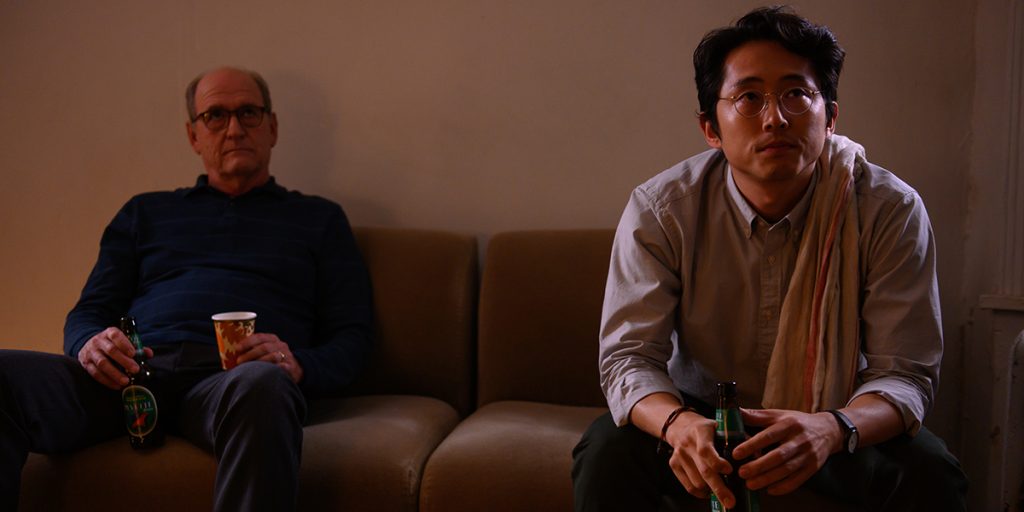
[shows a clip from “The Humans”]
Q: So it’s actually a nice segue to our questions. First question: “I saw The Humans today and it was such a distressing treat. I’d love to know what the atmosphere on set was like, energetically, emotionally. Was it as dark and uncanny as it appeared?”
SY: I think that’s the genius of Stephen. We would notice him shooting very specific things and shooting us through very specific things. He was like “I’m gonna put this feather in front of this frosted window, and then Richard, you’re going to be on the other side of that and do this whole scene.” And we’re like, “Okay” and you just trust him because he’s so genius.
But because of that, it never felt like we were actively engaging in something – maybe in the ways that it was presented. But what was stressful was, we were simulating an awkward Thanksgiving dinner where some things happened. Thanksgiving dinners are stressful [laughter] – that was real. But truly, the cast – we had a great, great time. They’re really truly wonderful. Yeah, it was not difficult, it was beautiful.
Q: You referred to Stephen Karam as such a powerful writer-director, with such a vision. But in fact, your last several films have been with directors with very singular, precise vision. So this is a great question: “Do you have any plans to possibly write or direct a film in the future yourself?”
SY: Oh, man. “Never say never”. At this point in my personal career, I’m really enjoying being beholden to my one part in someone else’s larger vision. I really love that, I love the collaborative nature of that. I don’t know why I don’t feel compelled at the moment to direct and write. I do want to; I feel like I might at some point, maybe – who knows? But not anytime soon.
Q: Okay, here’s another question: “After doing both Korean-speaking and English-speaking films, do you have a preference between the two?
SY: Well, pros and cons to each. I obviously speak English better than I speak Korean, so that part is far easier. Korean is a whole trip because I read so slow. What I will say, though, that I do like about doing Korean projects is there’s a layer missing that I have to like walk through, that requires its own work. Instead, you’re just kind of accessing humanity.
Whereas English-speaking roles sometimes tend to require we pass through a kind of cultural ethnicity gate so you have to kind of rewrite some things. But also, those are all interesting and wonderful exercises as an actor anyhow. So I don’t really have a preference, actually. Both things make me have to work.
Q: And there is so much variety to your work, which is alluded to with this question: “I thoroughly enjoy your performances in “Tuca and Bernie” and “Invincible”. How doe voice acting [compare] to in-person acting?”
SY: I love voice acting. Voice acting is really great. Obviously there is a huge difference between live action and voiceover. But what I will say is, mostly because you’re doing it on your own, you’re imagining your own understanding of the script. It’s really the director that has that bird’s eye view of how everybody’s performances come together. Although in “Invincible” I got the privilege to work with some of the cast one-to-one in the room at the same time, so that was really nice.
But what I really love about voice acting is, as an actor it really helped me to understand each take.
I think when I was in “The Walking Dead” a number of years, I used to chase perfect takes. Perfect takes are like, I feel it, I’ve said all the lines right, I hit all the marks. You don’t even have to cut, you just go from A to B and that’s the perfect take. And I would never get it. I would just be mad all the time, distressed about my performance.
Then when I got into voiceover, you kind of just throw [the lines]. And it’s not that it’s unimportant, but you’re just like, yeah, you’re being recorded, it’s being edited, and so you can just throw all your different takes, giving three variations, and not be so precious: “Oh, I want to do that again.” Doing that exercise was really wonderful for me as an actor.
Obviously, you can’t make everybody bend to your will when you’re doing live action. You’re still sharing in this collaborative process. But I think everyone also wants to be able to make mistakes and then just take it right back up from where you started without having to say you’re sorry about something. It’s just “I’m cool. Messed it up. Let’s just go right back and do it again” and go with it. That was a really really wonderful lesson.
Q: Final question – this comes from Japan: “In my country there are many people who admire you. If you could give one piece of advice to someone who admires you and wants to be an actor?
SY: Don’t worry about me. Find your voice. Find what sets you apart from everyone else, that makes you unique. And your voice, in and of itself in its honesty, is absolutely valid.
Q: Thank you.

